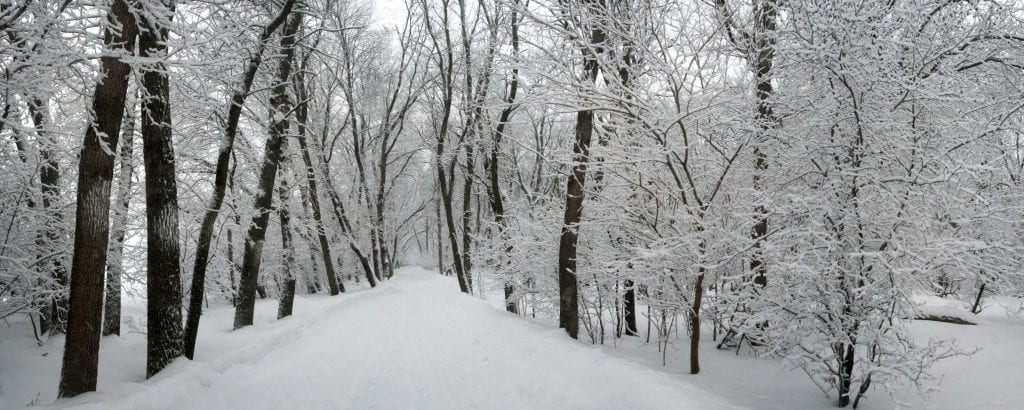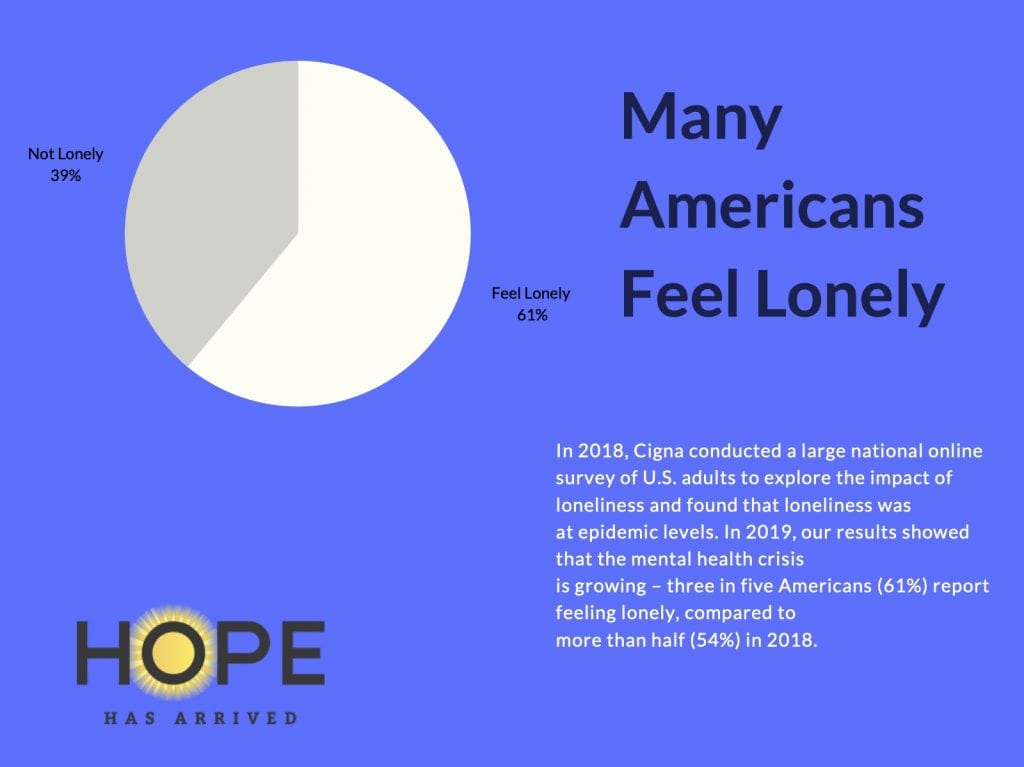
Hope for the Loneliness of Cancer
Discover the powerful and practical reasons for hope as you face this lonely journey.
Cancer challenges people in many ways, but the loneliness of cancer might be the most surprising and difficult experience, beyond the disease itself.
When you face cancer you may feel what Simon and Garfunkel so poignantly wrote in the song, “I Am a Rock”:
“A winter’s day
In a deep and dark December
I am alone
Gazing from my window to the streets below
On a freshly fallen silent shroud of snow
Hiding in my room, safe within my womb
I touch no one and no one touches me
I am a rock
I am an island.”
The feelings of loneliness weigh heavily in this song and you may feel something similar, even if reading this in warmer weather.
When we feel disconnected from others, we become like a rock, cold and isolated.
We need community
We were created to be communal creatures. Like it or not, we experience a fullness of joy that only comes through a relationship with others. And, so when we lack relationships, we feel that hole that people were made to fill.
 People already feel lonely enough. A 20191 study revealed that 61% of Americans say they are lonely, which is an increase from the previous year.
People already feel lonely enough. A 20191 study revealed that 61% of Americans say they are lonely, which is an increase from the previous year.
People with cancer are even more so, as cancer often complicates and compounds loneliness. The global pandemic added a double challenge for people with cancer. While most people have moved on, people with compromised immune systems still worry about catching illnesses that could prove fatal. Indeed, people who were already lonely now feel much lonelier.
Truly, the cancer journey can be an isolating path. Here are some reasons why people struggle with the loneliness of cancer:
Forced to pull back
People going through cancer are experiencing a major transition in their lives, from being healthy to being sick. They often have to pull back from work or other areas of regular social connection to pursue treatment, which can cause them to feel cut off.
Needing to avoid getting sick
Many people undergoing treatment often experience a weakened immune system, making them particularly vulnerable to illness. This heightened risk requires extra caution to avoid exposure to sickness. During the COVID-19 pandemic, even healthy individuals had to carefully limit their social interactions—an even greater challenge for someone battling cancer.
Changes in relationships
A person with cancer may feel like people pull away from them or even avoid them. The reasons can be complicated, but often people do not want to get involved with the suffering of others. They are scared, either of getting cancer themselves, or they don’t know how to help or what to say to someone with cancer. Relationships that once felt safe may no longer feel that way.
Lack of energy
The decrease in energy a person faces because of cancer, especially because of cancer treatment, can force a person to disengage from social events. Besides work, hobbies and social activities are great venues of connection. But when a person does not feel good, it can be challenging to engage like they used to.
Not feeling understood
Even surrounded by many other people, a person with cancer can feel alone, because people do not fully understand what they are going through. The pain, both physical and emotional, can be very intense. It’s possible to be in a room with people who know you yet be overcome by the burning feeling of not being understood. It can feel like there is an unclimbable wall between you and others.
Indeed, the cancer journey causes many reasons for people to feel lonely; many more not even mentioned here.
Yet, hope exists in this bleak landscape.
Like we often say at Hope Has Arrived, if you have hope, you have a lot going for you. And we believe hope is not just a mere whim or wish, but a confident expectation of coming good. Hope will help you walk through this gray season, knowing that your circumstance will not always be like this.

Here is why there is hope for the loneliness of cancer:
1. You can find a support network.
First of all, while some people may pull away from you, others will come near. You might even be surprised who these people are, and how they will want to help you. They could be friends or family.
For some, a health crisis ignites in them a compassion you never knew they had. Be open to letting these people love and support you. You may even need to tell them what you need, and not wait on them.
And while you may not always be able to be with them in person, phones or technological advances like Zoom, Facetime and WhatsApp allow for greater connection during these isolated times.
2. Cancer will connect you with others.
Cancer is so widespread. In fact, 1 in 3 women and 1 in 2 men will have it in their lifetime2. That means almost every person you interact with has been affected by it. You may find some people are much more sympathetic and understanding of your plight than you realized. Be on the lookout…you may find a friend in the place you least expect it. Also, support groups in person and online, can provide a great way to connect with others. You will find you may have a lot more in common than just cancer.
We invite you to join the Hope Has Arrived Prayer and Support Group. You can read more about it on our website here. It’s a private and safe environment to help you connect with others.
3. See this isolation as a temporary season.
It’s helpful to view a time of isolation like a long winter. Yes, you may be isolated right now, but it won’t last forever, and spring will come. This is temporary. Knowing this season will end offers you hope right now.
Just like the pandemic didn’t last forever, this stage of your cancer journey, such as treatment, will transition into another one (read Cancer Journey Seasons for more info). And with relationships, even after long droughts, we can find more opportunities to make new friends.
This leads to the most powerful reason for hope…
4. You can find your closest friend.
This proves the crux of this article. “There is a friend who sticks closer than brother,”3 says Proverbs. The friend this verse refers to is God. It is possible to have a meaningful relationship and friendship with the Creator of the universe. He is the most loyal and kind friend you will ever know.
For he says, “I will never leave you, nor forsake you.”4 God is a strength and a shield for those who put their hope in him.
Did you know that God sees you in your pain and loneliness? He knows all about it and keeps a record.
“You have taken account of my miseries;
Put my tears in Your bottle.
Are they not in Your book?”5
Indeed, he knows your pain, he knows every tear. He’s not trying to “fix” you, but be there with you.
In fact, he’s been there all along.
“Behold, I stand at the door and knock. If anyone hears my voice and opens the door, I will come in to him and eat with him, and he with me.”6
But sometimes we must invite God into our lives.
Inviting him in
God desires to be close to you, offering a friendship deeper and more steadfast than any human connection. While he understands your need for relationships with people, the relationship he invites you into brings peace and calm beyond anything you could ever imagine.
Whether you have talked to him before or not, perhaps this prayer expresses your heart:
“God, I feel so lonely. Can you please help me during this season of relational winter? Please provide community and support. And more than people, I open the door of my heart to you. Please come into my life and help provide the most amazing companionship that I never dreamed was possible. Amen.”
Today is a good day to take hold of the hope waiting for you. Hope for the loneliness of cancer.
To learn more about talking to God, read Asking God for Help.
Or, you can discover more about how you can Know God Personally.
You can also check out our Prayer and Support Group.
I have a question or comment…
How to know God…
Note: We are not doctors and we cannot answer your medical questions. However, we welcome your questions about finding hope and knowing God.
Footnotes: (1) In 2018, Cigna conducted a large national online survey of U.S. adults to explore the impact of loneliness and found that loneliness was at epidemic levels. In 2019, our results showed that the mental health crisis is growing – three in five Americans (61%) report feeling lonely, compared to more than half (54%) in 2018. (2) American Cancer Society 2014 (3) Proverbs 18:24 NIV (4) Hebrews 13:5 ESV (5) Psalm 56:8 NASB (6) Revelation 3:30 NASB
